- Home
- J. A. Konrath
Fuzzy Navel
Fuzzy Navel Read online
Synopsis:
Anthony and Macavity Award finalist J.A. Konrath returns with the latest gripping — and hilarious — Jack Daniels mystery.
Things are going well for Lieutenant Jacqueline “Jack” Daniels of the Chicago Police Department. She has solved some of the city’s toughest and most high-profile homicides. Her personal life is finally in order. Her friends and family are safe and happy. And she just got a call that eased her mind like nothing else could: Alex Kork, one of the most dangerous criminals Jack ever arrested, killed herself while in jail.
But things sour quickly when a group of vigilantes on a murderous spree decide to take down a cop and the people she cares about ... and they turn downright awful when Jack discovers that Kork may not be dead after all.
The next eight hours will be the worst of Jack’s life. And that’s saying something.
Fuzzy Navel is perfect for readers who like their mysteries with a shot of humor.
Fuzzy Navel
By
J.A. Konrath
The fifth book in the Jack Daniels series
Copyright ©2008 by Joe Konrath
This book is for George Dailey,
whose unwavering friendship and support
make him worth several times his weight in gold.
Or, in his case, barley.
FUZZY NAVEL
1½ oz. peach schnapps
3 oz. orange juice
Pour schnapps in a rocks or
old-fashioned glass filled with ice.
Add orange juice.
4:38 P.M.
KORK
IT’S QUIET IN THE SUBURBS. The only sound is from the cab that has dropped me off, making a U-turn at the dead end, then heading back down the quiet, winding road. Its taillights quickly disappear, swallowed up by the multitude of trees.
I walk up the driveway and look at the house. It’s a ranch, laid out in the shape of an L, occupying half an acre of green lawn speckled with fallen leaves. There’s a double-car garage, the door closed. I see Mom through the front bay window. She’s sitting in a rocking chair and reading a book — how much more stereo typical elderly can you get? I check the front door, and as expected it is locked.
I walk around the side of the house, running my hand along the brown brick, passing windows that should probably be washed. This is a big departure from the Chicago apartment. A lot more space. A lot more privacy. I’ve discovered that privacy is important. No neighbors for more than a quarter mile is a good thing. With all of the tree coverage, it’s like being in the middle of the woods, rather than only five miles away from O’Hare Airport.
I stop at the back porch — a slab of concrete with the obligatory lawn chairs, a wrought iron sun table, and a veranda — and I close my eyes, breathing in the cool autumn air. Somewhere, someone is burning leaves. I haven’t smelled that since my youth. I fill my lungs with the scent and smile. It smells like freedom.
The sliding glass patio door is open, and I decide to give Mom a lecture about that. Just because the suburbs are safer than the city doesn’t mean that all of the doors shouldn’t be locked.
I walk into the kitchen, catch the odor of home cooking. A pot is on the stove. I check the contents. Stew. I pick up the spoon, give it a stir, take a little bite of potato. Delicious.
Mom yells, “Jacqueline?”
I consider answering her, but decide a surprise is in order instead. I take out my gun and tiptoe into the hallway.
“Jacqueline? Is that you?”
I look left, then right, scanning for the psychotic cat that lives here. He isn’t around.
“Jacqueline, you’re frightening me.”
That’s the point, Mom.
I peek around the corner and see that Mom is standing up. She’s in her seventies, short hair more gray than brown, her back bent with age. She’s wearing a house dress, something plaid and shapeless. Mom’s eyes dart this way and that way. They settle on me, and she gasps.
“Oh my God,” she says.
“Did I scare you? You shouldn’t leave the back door open, Mom. God only knows what kind of weirdos can get in.”
Mom’s chest flutters, and she says in a small voice, “I know who you are. My daughter told me all about you.”
She reaches for the phone, but I’m on her in three steps, giving her a firm slap across her wrinkled face.
“I’m going to ask you this one time, and one time only. And then I’m going to start hurting you.”
I smile, knowing how it makes the scar tissue covering most of my face turn bright pink, knowing how horrifying it looks.
“Where’s Jack?”
4:57 P.M.
MUNCHEL
THE TARGET IS two hundred and eighty-three yards away. James Michael Munchel knows all about mil dots, and how to calculate distance with the reticle, but he’s using a laser measuring unit instead. This isn’t cheating. A sniper can and should use every bit of technology available to him in the field, whether he’s on a roof in Dhi Qar, Iraq, or crouching behind some shrubs in the Chicago neighborhood of Ravenswood.
Munchel is sitting on the lawn, legs crossed, the tip of his Unique Alpine TPG-1 rifle peeking out through the leafy green dogwood. He arrived here two hours ago, but had selected this spot three weeks earlier. The house is unoccupied, and Munchel has pulled the For Sale sign out of the lawn and set it facedown. Realtors probably won’t stop by this late. If one does… well, too bad for her.
Munchel is wearing a camouflage jacket, leggings, and black steel-toed boots he bought at the army/navy surplus store on Lincoln Avenue. He can’t be seen from the sidewalk fifteen feet away. Munchel knows this for a fact, because he’s done several dry runs prior to today. He’s practically invisible, even if someone is staring right at him.
To avoid arousing suspicion, Munchel didn’t walk here in full camo. He came in street clothes — jeans and a blue shirt — and awkwardly changed while crouching behind the dogwood, putting his civvies in the black two-wheeled suitcase he towed along.
Munchel scratches his stubble, then peers through the Leupold scope, which has been zeroed out at two hundred yards. The crosshair is slightly above and to the right of the target’s head, to adjust for the wind and the bullet drop. He’ll never admit it, but he doesn’t understand how to determine MOA — minute-of-angle. He can fake it online, while posting on the sniper message boards, but he doesn’t really know how to calculate the actual degrees. In the forest preserve near his house, Munchel can hit a target from five hundred yards and keep the grouping within a four-inch radius. Who cares what the MOA is? It’s good shooting no matter how you calculate it.
The target has his back to Munchel. He’s in his living room, on the first floor of the two-flat, sitting at the computer. Just like he is every day at this time.
Predictability is a killer.
The blinds hanging in the large, three-section bay window are open, and Munchel can see straight down the hallway, all the way to the back of the house. He nudges the rifle slightly, to check what the target is surfing.
Pornography. Some weird shit with chicks wearing rubber aprons and wielding whips.
Freak, Munchel thinks. Deserves everything he’s about to get.
Munchel glances at his watch, a Luminox 3007, the same kind that Navy SEALs use. Less than a minute left. Munchel’s hands start to shake, and he realizes he’s breathing heavy. Not from fear. From excitement. All the training, all the planning, it all comes down to this moment.
The butt plate is snug against his armpit, his face is tight against the cheek pad, the safety is off. The aluminum gun chassis is on the concrete planter behind the dogwood, a hard surface that ensures the gun will stay steady. Munchel takes a deep breath, lets it out through his teeth. His ears tell him there is no
traffic coming, which is essential because he’s shooting across the street — it would be bad if a car entered his line of fire at the moment of truth.
The target stands up, walks toward the window, seems to look right at him. Impossible, of course. He’s much too far away, too well hidden. But it’s still unnerving. Munchel chews his lower lip, begins the countdown.
The target turns. Munchel completely empties his lungs and waits… waits… waits… then squeezes the trigger with the ball of his finger, trying to time it between heartbeats like he’s read about online.
There’s a loud CRACK. The target’s head explodes, and he pitches forward.
Munchel sucks in some air and lets it out as a laugh. How ridiculously easy. He checks to see if anyone around him noticed the gunfire. The sidewalks are clear. No one opens a door and sticks their head out. Everything is completely normal, just an average fall day in the city.
He reaches for his canteen — also an army/navy store purchase — and slurps down some purple Gatorade. His untraceable prepaid cell phone vibrates, and he stares at the number. It’s Swanson. Anxious to see how it went, to meet at the rendezvous point and brag over beer and chicken wings.
Munchel ignores the call. He has other ideas of how to celebrate.
A streetlight comes on, its sensor activated by a timer. Munchel loads a round, aims, and takes it out. That’s two shots now. Still, no one seems to notice. How disappointing.
He takes out his phone and dials 911.
“I was walking down Leavitt and heard someone shooting. I think my neighbor has been killed.”
“What is your name, sir?”
“He’s at forty-six fifty-two. I think someone shot him.”
“Can you give me your name?”
Munchel hangs up, sips more Gatorade, and hunkers down to wait for the police to arrive.
5:32 P.M.
JACK
MY PARTNER, Sergeant Herb Benedict, crams the last mini chocolate donut into his mouth, wipes a hand across his gray mustache, and then tries to heave his bulk out of the less-than-comfortable confines of my 1984 Chevy Nova. He has to rock, twice, before he gets enough momentum to break the tug of gravity between his ass and the seat.
“Thanks for not judging me,” he says as we approach the yellow police tape.
“Because you ate two packages of donuts even though your doctor put you on a high-fiber diet?”
Herb nods. “Man cannot live on bran alone, Jack. Every day, as a snack, my wife mixes me a high-fiber sugar-free weight loss shake. Then she adds even more fiber.”
“Sounds healthy.”
“You want some? I got a zipper bag in my pocket full of the stuff. It’s like drinking a stalk of wheat.”
Dried leaves in shades of gold, red, and brown blanket the sidewalks. The cool air carries a crisp, woodsy scent. Spring and summer smell like garbage and sewage. Winter, like car exhaust. Fall is the only time of year Chicago smells nice.
The setting sun casts long shadows on the street, and ours walk ahead of us. I like September because the climate is moderate, and because I have brown hair and brown eyes, and 85 percent of my clothing matches this particular season.
“Does your wife know you’re snacking between nutritious meals?” I ask.
Herb’s basset hound jowls are turned down: his serious face. “She suspects. Last night she found some powdered sugar on my tie. I spent twenty minutes trying to convince her it was heroin.”
A rookie guards the crime scene, keeping away reporters and gawkers. Young, curly hair, eyes intent. I don’t recognize him, and he doesn’t recognize us, asking for ID. This is perfectly acceptable. I’m wearing a pumpkin-colored Anne Klein jacket with a red chevron pattern, taupe Armani pants, and rust Gucci pumps. He probably thinks I’m a waif runway model looking for my photo shoot. Well, a retired one, maybe. There aren’t too many fashionistas in their late forties.
I open my clutch — a Wal-Mart purchase, but hey, it matches the outfit — and remove my star, flashing it at the noob.
“Lieutenant Jack Daniels, Homicide. This is Sergeant Benedict.”
The rookie — his name tag reads Sakey — doesn’t seem impressed with either my rank or my outfit, but he lets us pass. We walk into the first floor of a two-flat vintage brownstone, the space already crawling with cops: uniforms, plainclothes, and techies taking pictures and video. I feel my stomach go sour, something that has been happening more and more whenever I visit a crime scene. Without letting Herb see, I remove a roll of antacids out of my jacket pocket and pop three. Not that I fear showing weakness in front of my partner. My concern centers around the fact that my antacids are mint flavored, and Herb likes mint. I haven’t discovered a flavor that Herb doesn’t like, even though I’ve looked. I only have a few tablets left, and I don’t want to share.
“She’s just trying to look out for you, Herb,” I say.
“I know. But I have a feeling that the extra years this high-fiber diet may allow me to live will get cancelled out by the amount of time I spend on the john.”
Herb and I each take some plastic booties out of the box by the door and slip them over our shoes. There are gloves as well, and I snap one on.
The house isn’t very well lit, one thrift shop floor lamp and a living room chandelier with two bulbs not working. The CSU has brought in a portable halogen light, which illuminates the space to operating room brightness. There’s a computer desk, empty pop cans, fast-food wrappers, and CDs randomly strewn over the top. The monitor is a flat screen, and there are speakers screwed into the walls. A red beanbag chair which doesn’t match the red shade of the sofa which doesn’t match the red shade of the drapes. The TV is an older model, sitting on a cheap pressboard cabinet. The walls are bare except for a poster of a topless Jenna Jameson.
The victim is a male Caucasian, average build, sprawled out facedown on the floor. He’s wearing jeans and nothing else. His blond hair is matted with blood, and a halo of red has soaked the beige carpeting around his head. I’ve seen enough gunshot wounds in my day to recognize the cause of death.
I crouch down, squint at his right hand. In the webbing between his thumb and index finger there is a black tattoo of a tombstone. Written on its face is a number five with angel wings on it.
A bulge in the back of the vic’s pocket appears wallet shaped, and I tug it out with a gloved hand. Driver’s license shows me a picture of a man named Robert Siders who resides at this address. The hair seems the same. I pass the wallet to Herb, bend down, and gently turn the deceased’s head to the side. No one looks like their driver’s license picture, but in this case I can’t even make a comparison — the victim’s face has been blown off.
The wallet holds thirty-three dollars, a check stub from a local oil and lube place, and a wrinkled time card signed by the manager of same garage. No credit cards.
Without prompting, Herb yanks out his cell, calling Dispatch. I stand up, take a few steps away from the body, and let my eyes sweep the room while Herb speaks into the phone.
Sakey — the curly-haired rookie who carded me earlier — walks up next to me and peers down at the body.
“Roommate got angry,” he ventures.
“One-bedroom apartment,” I say. “No roommate.”
“Girlfriend, then.”
“No girlfriend. The house is messy, badly furnished, and there’s a poster of a porn star on the wall. No woman would live here.”
Sakey folds his arms and puts a hand on his chin. I watch the wheels spin. “Okay, drug deal gone bad. Dealer shot him in the face.”
“No drugs. He’s got ink on his hand. Prison tattoo. Did five years, got paroled. There’s a signed time card in his wallet — he needs to turn it in to his PO, which means he’s getting random drug tests. If he’s holding down a job, he’s keeping clean.”
He nods. “Fine, we check for former associates. One of them must have came in and—”
“No one came in,” I say.
Sakey raises an eyebrow.
“Then who shot him in the face?”
“No one shot him in the face. They shot him in the back of the head.”
“I’ve seen GSWs. He clearly was shot—”
“By a high-velocity rifle in the back of the head,” Herb finishes for him, snapping his cell phone closed. “Higher velocity causes a shock wave in tissue, which makes big exit wounds.”
“Record?” I ask Herb.
“In for ten and out in five. One count unlawful restraint. One count deviate sexual assault. One count aggravated criminal sexual abuse.”
“Our vic is a rapist,” I say, staring down at the body. “Herb, get the information on the woman he assaulted, and her family.”
“You think they hired a hitter?” Sakey asks.
It’s the first assumption he may have gotten right, but he says it to my back — I’m already at the window facing the street, letting my eyes roam back and forth, up and down. I find it at nose level.
The bullet punched through neatly, leaving a hole the size of a dime. No cracked pane or shattered glass — another indicator of a very fast round. I stand in front of it and face the apartment, looking from the window to the victim, and then down the hallway. I follow the path, scrutinizing the far wall, and locate the bullet’s final resting place; another small hole, this one ringed with specks of blood.
I scan the CSU officers in the room and see one that I know, Dan Rogers. I call him over.
“Bullet wound up over here,” I tell him. “But before you dig it out, I need to borrow your laser pointer.”
I have no idea if he actually has a laser pointer in his box full of stuff, but he does, one of those thin models the size of a AA battery. I jam it into the depression in the wall, have Herb stand next to the window, and spend a minute lining up the holes.
“Who was first on the scene?” I ask Sakey.
“Beat cop named Rory. Out in back losing his lunch.”

 What Happened to Lori
What Happened to Lori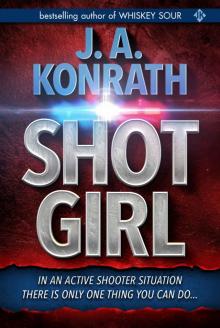 Shot Girl
Shot Girl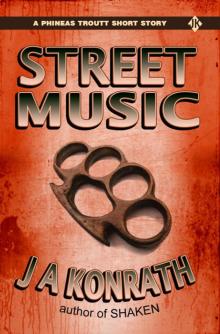 Street Music
Street Music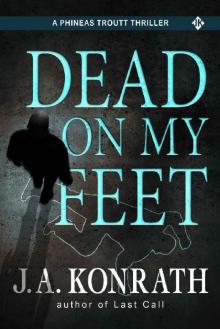 Dead on My Feet
Dead on My Feet What Happened To Lori - The Complete Epic (The Konrath Dark Thriller Collective Book 9)
What Happened To Lori - The Complete Epic (The Konrath Dark Thriller Collective Book 9)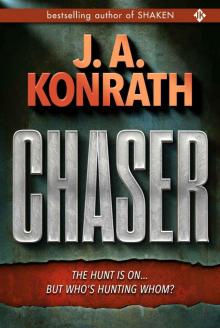 Chaser
Chaser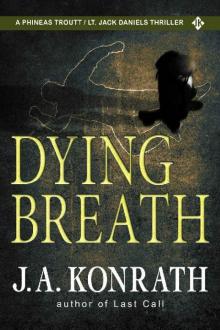 Dying Breath - A Thriller (Phineas Troutt Mysteries Book 2)
Dying Breath - A Thriller (Phineas Troutt Mysteries Book 2) Jack Daniels Six Pack
Jack Daniels Six Pack Jacked Up! (A Lt. Jack Daniels/Leah Ryan Mystery)
Jacked Up! (A Lt. Jack Daniels/Leah Ryan Mystery)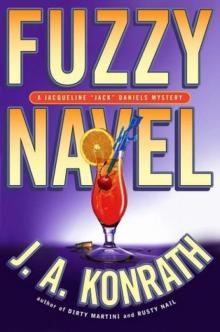 Fuzzy Navel
Fuzzy Navel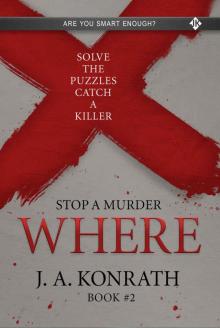 STOP A MURDER - WHERE (Mystery Puzzle Book 2)
STOP A MURDER - WHERE (Mystery Puzzle Book 2)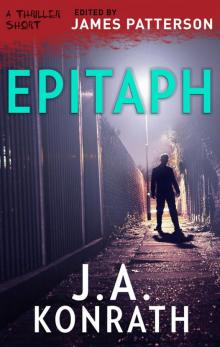 Epitaph
Epitaph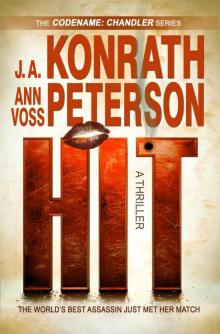 Hit: A Thriller (The Codename: Chandler)
Hit: A Thriller (The Codename: Chandler)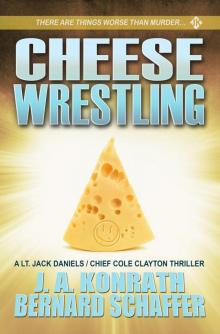 Cheese Wrestling: A Lt. Jack Daniels/Chief Cole Clayton Thriller
Cheese Wrestling: A Lt. Jack Daniels/Chief Cole Clayton Thriller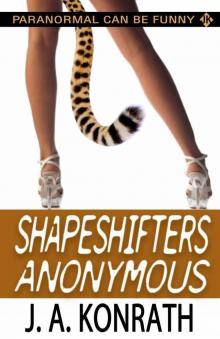 Shapeshifters Anonymous
Shapeshifters Anonymous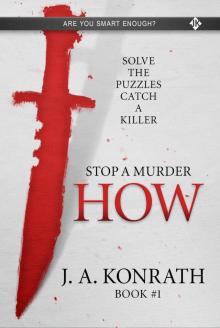 STOP A MURDER - HOW (Mystery Puzzle Book 1)
STOP A MURDER - HOW (Mystery Puzzle Book 1) Bloody Mary
Bloody Mary Dying Breath
Dying Breath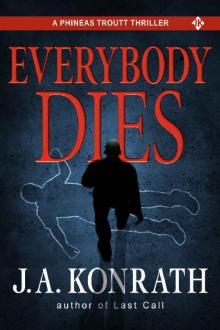 Everybody Dies - A Thriller (Phineas Troutt Mysteries Book 3)
Everybody Dies - A Thriller (Phineas Troutt Mysteries Book 3) DRACULAS (A Novel of Terror)
DRACULAS (A Novel of Terror) Shot of Tequila
Shot of Tequila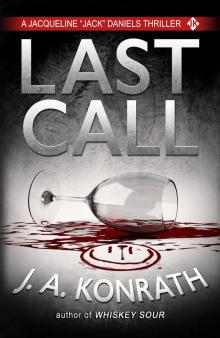 Last Call - A Thriller (Jacqueline Jack Daniels Mysteries Book 10)
Last Call - A Thriller (Jacqueline Jack Daniels Mysteries Book 10)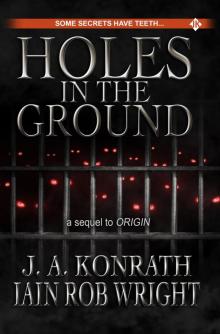 Holes in the Ground
Holes in the Ground![Shaken [JD 07] Read online](http://i1.bookreadfree.com/i1/04/01/shaken_jd_07_preview.jpg) Shaken [JD 07]
Shaken [JD 07]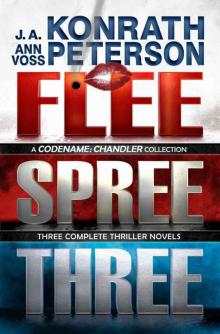 Flee, Spree, Three (Codename: Chandler Trilogy - Three Complete Novels)
Flee, Spree, Three (Codename: Chandler Trilogy - Three Complete Novels)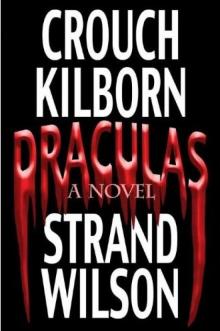 Draculas
Draculas Jack Daniels Stories
Jack Daniels Stories Wild Night is Calling
Wild Night is Calling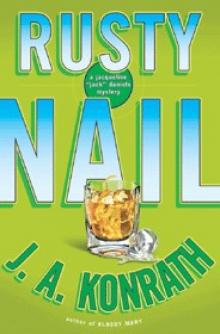 Rusty Nail
Rusty Nail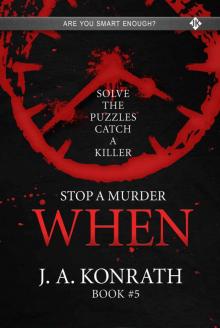 STOP A MURDER - WHEN (Mystery Puzzle Book 5)
STOP A MURDER - WHEN (Mystery Puzzle Book 5)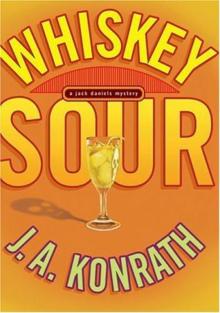 Whiskey Sour
Whiskey Sour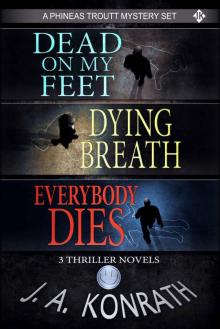 Phineas Troutt Series - Three Thriller Novels (Dead On My Feet #1, Dying Breath #2, Everybody Dies #3)
Phineas Troutt Series - Three Thriller Novels (Dead On My Feet #1, Dying Breath #2, Everybody Dies #3)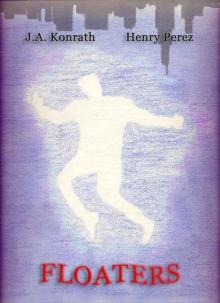 Floaters - A Jack Daniels/Alex Chapa Mystery
Floaters - A Jack Daniels/Alex Chapa Mystery J.A. Konrath / Jack Kilborn Trilogy - Three Scary Thriller Novels (Origin, The List, Haunted House)
J.A. Konrath / Jack Kilborn Trilogy - Three Scary Thriller Novels (Origin, The List, Haunted House)![Shaken (Jacqueline Jack Daniels Mysteries) [Plus Bonus Content] Read online](http://i1.bookreadfree.com/i2/04/10/shaken_jacqueline_jack_daniels_mysteries_plus_bonus_content_preview.jpg) Shaken (Jacqueline Jack Daniels Mysteries) [Plus Bonus Content]
Shaken (Jacqueline Jack Daniels Mysteries) [Plus Bonus Content]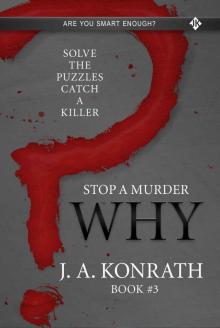 STOP A MURDER - WHY (Mystery Puzzle Book 3)
STOP A MURDER - WHY (Mystery Puzzle Book 3)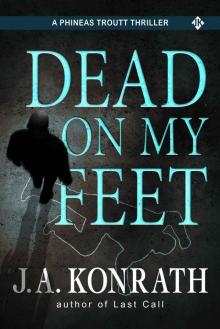 Dead On My Feet - A Thriller (Phineas Troutt Mysteries Book 1)
Dead On My Feet - A Thriller (Phineas Troutt Mysteries Book 1) Cherry Bomb
Cherry Bomb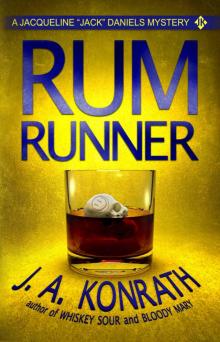 Rum Runner - A Thriller (Jacqueline Jack Daniels Mysteries Book 9)
Rum Runner - A Thriller (Jacqueline Jack Daniels Mysteries Book 9)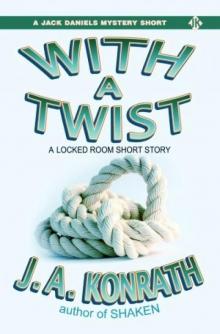 With a Twist
With a Twist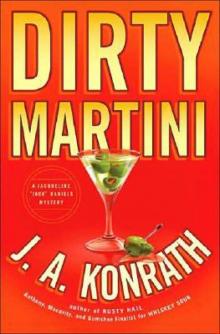 Dirty Martini
Dirty Martini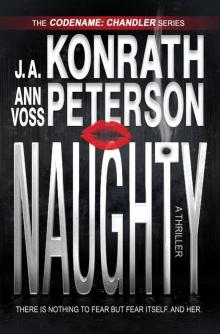 Naughty
Naughty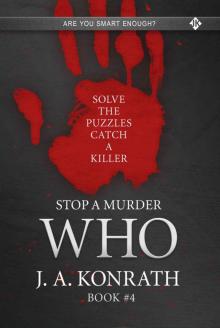 STOP A MURDER - WHO (Mystery Puzzle Book 4)
STOP A MURDER - WHO (Mystery Puzzle Book 4)